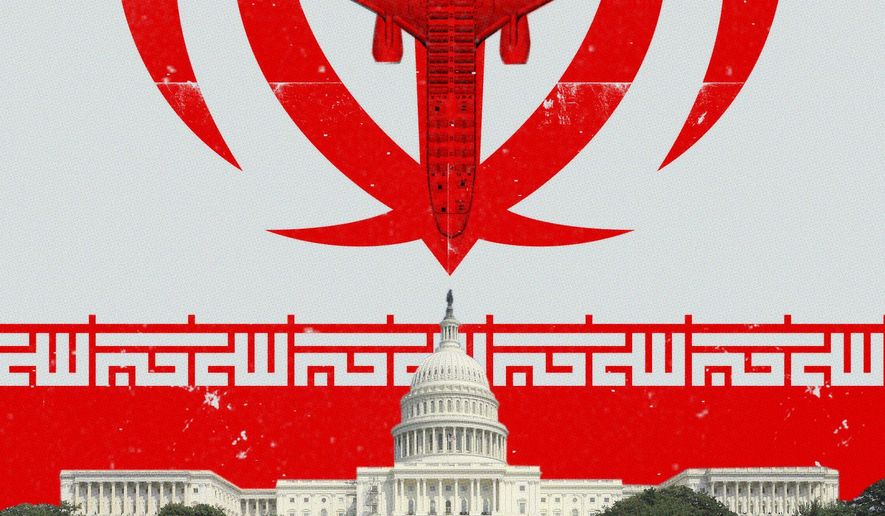OPINION:
As horrid as it was when riotous protesters recently stormed the U.S. Capitol building, that bad day could have been worse. Our citadel of democracy only two days before had been threatened with total destruction as terrorists claimed they would plunge a jetliner into the Capitol on the very same day a mob ended up breaching the halls of Congress.
On Monday, Jan. 4, a voice interrupted air traffic control in New York with a warning that “We are flying a plane into the Capitol on Wednesday [Jan. 6].” The fanatic added that “Soleimani will be avenged.” The reference was to the Iranian general killed by an American drone strike last year.
A successful plane attack would have achieved an unmet goal from 9/11 in 2001, a horror thwarted because passengers aboard the hijacked United Flight 93 heroically stormed the cockpit and the airliner crashed into a Pennsylvania field instead of into the Capitol. Now, although security at the Capitol already has been strengthened, this week’s unfulfilled threat demonstrates how our air traffic system needs greater security as well.
Air traffic communications need to be secure. Interference, interruption, or fake messages can result in disasters and deaths. Although the FBI and the Federal Aviation Administration are investigating how the Iranian threat disrupted normal communications, the underlying problem remains, namely that the FAA uses antiquated technology which cannot be made as secure as needed.
In the works, however, is the new Federal Aviation Authority (FAA) Enterprise Network Services Program (FENS) which will serve as a crucial first step toward our broader air traffic control modernization efforts. FENS will serve as the successor of the FAA Telecommunications Infrastructure (FTI) program, a long-outdated system that cannot fill today’s demands for the national airspace system, much less tomorrow’s needs.
The shift is overdue to digitized, satellite- and GPS-based systems that are less prone to interference or hacking by terrorists. Plus the sophistication of NextGen makes it tougher for terrorists to hack into the system—unlike the older analog radios that can be interrupted by anyone who tunes a dilapidated transmitter to the aviation frequencies.
This latest communication breach demonstrates the broad threats to our air traffic control system. Attacks aimed at aviation are bigger and happen more frequently.
From 2017-18, for example, cyberattacks against airlines increased by 15,000%. (As Forbes wrote, “That’s no decimal point error. 15,000%!”)
But dramatic benefits will come from modernizing air traffic control to meet the expected rebound in travel after the COVID-19 crisis ends. Pre-COVID-19, delays caused by antiquated equipment cost passengers, airlines and airports $28 billion in 2018 alone. One key reason was the necessity of spacing. The FENS change to satellite-based navigation will support tighter-yet-safe spacing between takeoffs and landings. Flying time will be reduced by the ability to launch and land more flights per hour, while adding capacity to the National Airspace System.
Less time waiting on the ground with engines running will lessen noise pollution, reduce fuel consumption, cut emissions and keep the air cleaner.
And digitizing communication saves several minutes for each flight. The jargon-filled chatter between pilots and air traffic controllers will be replaced with text messages that are clearer while reducing human error caused by problems with diction or hearing.
Satellite-based GPS systems also add safeguards, allowing precise locating and tracking of aircraft and of weather conditions, feeding data automatically into flight computers instead of being manually input after radio exchanges between pilots and controllers.
FENS means a positive transformation of air travel that reduces delays, reduces flight times, improves safety, adds capacity and invites innovation such as the technology to handle drone aircraft.
Although the economic advantages cannot be overstated, recent events highlight the need for security to prevent airlines from ever again being used as missiles against our homeland. The mob scene at our Capitol was horrid, yet far less than the disaster that terrorists claimed they would unleash.
While Congress investigates security failures on Capitol Hill, it also should act to push and enable the FAA to better secure our entire air travel system, protecting our people, landmarks and cities, and protecting our economy.
What happened on Jan. 6 cannot be allowed to happen again. And there should never be another 9/11. We must be better prepared against all types of threats.
• Former U.S. Rep. Ernest Istook, Oklahoma Republican, chaired the Transportation Subcommittee on the House Appropriations Committee, and worked on aviation and homeland security issues.




Please read our comment policy before commenting.